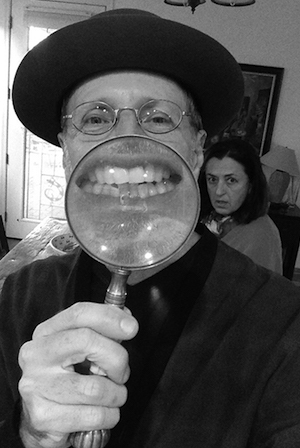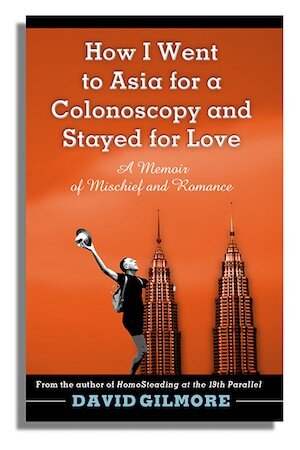Interviews
David Gilmore on Finding Love in Strange Places, Writing About It, and a Colonoscopy
Monday, December 11, 2017

David Gilmore
We first met David Gilmore many years ago during a writing conference in Tucson, Arizona. He stood out among the other attendees in part because he was just so smart, funny. He had already done so much work as a writer, and he was a fantastic listener. When we saw that he had a new book out, How I Went to Asia for a Colonoscopy and Stayed for Love: A Memoir of Mischief and Romance, we decided we would pick his brain about writing, travel, love, and colonoscopies. Read this interview on the HuffPost.
The Book Doctors: How did you learn to be a writer?
David Gilmore: Pretty much everything Ive done in my life has been self-taught. I learned to write because I needed to clear my head so I could have a good nights sleep when Xanax was getting a little expensive and addictive. I also learned to write when I had my radio show on Public Radio International (Outright Radio). Back before that I used to write in my daily diary as a kid. I would open up the little red vinyl book and scribble something profound like, Normal day. Doesnt that just scream future author? I dunno. I guess I learned to write by being an observant person. I listen. I watch everything carefully. I ask questions. I feel too much. And this all fills my mind and at some point, I have to just start emptying it onto the written page. So, one could say writing has become a survival skill in not becoming overburdened by everything and everyone.
TBD: What are some of your favorite books, and why?
DG: Mostly I read non-fiction because with politics these days, really, who needs fiction? Basically, Ill read anything by Michael Pollan, Bill Bryson, and Beth Lisick. It doesnt matter to me what they write about, Ill read it. I recently found a copy of The Life and Times of the Thunderbolt Kid in Goodwill and I bought it for a dollar. Brysons hyperbolic style has me squealing with delight. And he takes us back to a time in America his childhood in Iowa when life seemed simple and people didnt go around with semi-automatic weapons in their suitcases. Im currently reading White Trash by Nancy Isenberg because all thats going on with Trumps rise to power is dissected in that book. I also am reading Gods Hotel by Victoria Sweet about a doctor who works at an old almshouse in San Francisco caring for the un-curable. I like books that fill me with someone elses life experience or help explain to me what in Sam Hill is going on here, and frankly, right now I am in need of a lot of splaining.

TBD: Tell us about the long and winding road to writing How I Went to Asia for a Colonoscopy and Stayed for Love.
DG: The long and winding road began in the States where I had become bored with my romantic life and unable to afford health insurance. Coming from a long line of intestinal malcontents I was in need of a colonoscopy. I had read that Thailand was the place to go for overseas medical care, so on a whim, I just booked a flight and made an appointment for the procedure.
After having a colonoscope make its way through my long and winding intestines, much to my delight I found that Thailand actually suited me. I had the time of my life! And when I came back to the States, my life seemed so empty and dull that I just kept going back to Southeast Asia and expanding out from Thailand to Cambodia, Laos, Myanmar, and eventually Malaysia.
Then something really big happened. I dont want to spoil the book, but I felt compelled, so to speak, to move to Malaysia. It wasnt just a holiday. I gave up my life in the US and moved there. And within 6 weeks of arriving, I met the guy Id been looking for my whole life. Thus began a storybook gay romance in a Muslim country, of all places. It was starting to seem like a plot from a book or a moviesomething perhaps by Elizabeth Gilbert. I knew that if my Malaysian boyfriend and I ever got married, the book would have a full narrative arc and I really would have no choice but to write it. And thats how it came to be.
TBD: Were curious about how you approached publishing this book. Did you go after agents and publishers?
DG: I did go after agents. And there was some initial interest from several. I think, however, the raunchy beginning to the book may have put some of them off if they didnt go beyond the first few chapters. However, I am of the belief that the publishing industry is no longer in its golden age and to be an author with an agent and a contract with a publisher isnt really all its cracked up to be. Ive heard too many stories of authors getting little or nothing from their publishers. I know friends who have book contracts who have to pay for their own book tours and do all their own marketing. Or agents who never found a publisher for their clients. I began to wonder what the point of a publishing contract was. I felt that my story was begging to be told NOW and couldnt wait for agents and publishers. Thus, I jumped on the self-publishing bandwagon.
TBD: What are the pros and cons, the do's and don'ts of self-publishing? How do you avoid some of the pitfalls?
DG: The biggest con for most people is that youre on your own to produce and market it. For me thats not a con because I am by trade a graphic designer, and so knocking out the cover and interior design is something I can do while watching Sarah Huckabee Sanders do her sour face at the White House press corps. The plus side of self-publishing is that you as the author have full creative control and no one is going to reject you because youre unknown or frankly, your story is kinda dumb. Anyone can publish, which is a blessing and a curse. People have been known to strike a chord with readers and hit it big, but its a long shot and its a game. And if youre up for playing the game without getting defeated by the odds that youll be a huge success, the world is your playground. But you know, when your book is released and you check the sales tally and on your first day you only sold 17 copies, well, you have only yourself to blame. And when you find that you misspelled something, you cant call the editor and have a hissy fit about it.
TBD: This is kind of a personal question, but what was your budget for making the video trailers for this book?
DG: Hmm, lets seemy budget. OK, the Marketing Budget Office has deliberated and just released the figures on the video trailer budget. It was zero. In addition to writing, I also make films so I just pulled those together myself from videos I shot over the years of traveling in Asia. The trailers seemed to catch peoples attention. Whether they translate to sales remains to be seen.
TBD: What was it like to have a colonoscopy in Thailand?
DG: Now that is a personal question! Basically, getting a colonoscopy in Thailand was just like in the US except at about 1/10th the cost. A colonoscopy, however, no matter where you are, is kind of a disgusting proposition. Being in Thailand makes it more fun because I find Asians so fascinating and amusing. Sitting in the bowel preparation room in Bangkok (appropriately appointed with brown furnishings), Im more likely to have fun chatting with someone or watching inscrutably bad Thai daytime television. I did enjoy a night of frolicking in the worlds most extraordinary sex club with the cleanest colon on earth afterward. Perhaps that should have been the title of the book? Really, though, the book is not all about my colonoscopy (who would want to read about that) or even sex. The book starts out there and moves on to more meaningful adventures like the slow boat up the Mekong River, the Flying Nuns of Luang Prabang, and negotiating a gay relationship in a Muslim country.
TBD: How did writing this book about rediscovering yourself in the middle of your life change you?
DG: Well, I lost something significant in Asia: my loneliness. And I got my life back. For years I moped around America complaining about being middle-aged, nerdy, and unlovable. When I couldnt take it any longer, I took off the tight shoe of American life and let myself go on an incredible journey of love. And I got what I always wanted a partner and brought him back to the US with me. His name is Chuan and he tucks me in bed each night and tells me he loves me. Meeting him turned my life around. I went from being a cranky curmudgeon to being contented, playful, and at least somewhat hopeful about my life.
TBD: Was there any part of your book that was particularly difficult for you to write?
DG: Yes. There is a chapter about a young student I had when I was teaching for the United Nations in Malaysia. He was a Burmese refugee who fled over the border from Myanmar fleeing religious persecution. I taught him and a bunch of adorable kids in a filthy, run-down, absolute hole of a school in a slum in Kuala Lumpur. Well, something awful happened to that boy and it broke my heart. It pained me so much to write that chapter, and to this day I cannot read it without bursting into tears. That boys life touched me and I will never forget him.
TBD: We hate to ask you this, but what advice do you have for writers?
DG: I dont know that Im in the position to be giving advice to other writers, honestly. But if I had to say anything to anyone about writing (or any creative pursuit) I would say this: be critical. Be REALLY critical of your own work. Ignore that nonsense about defeating the inner critic. The inner critic is very important to your process of refinement. Im not of the school of belief that anything we create is beautiful and worthy. I believe the PROCESS is valuable to simply write whatever is on your mind. But I dont believe that it is necessarily going to be worth reading by others. Reading and staying aware of current events and thought trends and history and keeping your eyes open to all aspects of society is very important, not just to being relevant but for ones output to be taken seriously.
David Gilmore is a freelance writer, photographer, and filmmaker living in Tucson, Arizona. He was the host and producer of the Edward R. Murrow Award winning radio show Outright Radio, featured nationally on Public Radio International from 1998-2004. He is a NEA and CPB grantee and has contributed essays to theGay & Lesbian Review Worldwide, The Advocate, and was a contributing author in Johns, Marks, Tricks, and Chickenhawks. He is the author of the bookHomoSteading at the 19th Parallel one mans adventure building his nightmare dream house on the Big Island of Hawaii.